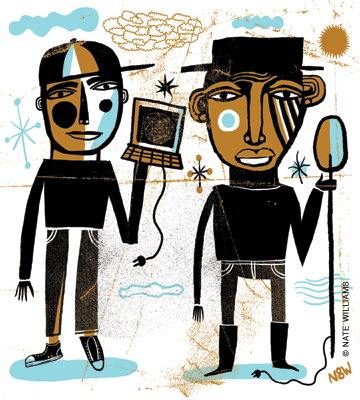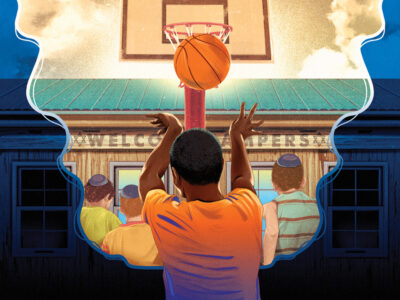
Carrots, potatoes, and life lessons in Costa Rica.
By Eric Plunkett
Always say yes. That’s the mindset. Usually, it means afternoon coffee and homemade bread (delicious). Once, it meant watching Rocky Balboa with a Sly Stallone fanático (surreal). And then there’s the 12-hour horseback-riding misadventure (never again). The first rule of building trust in a community is to go with the flow, accept every offer, do whatever you can to establish relationships. So when Nela, my 21-year-old host sister, asked me to go with her to the carrot-packing plant, I agreed. What’s a few hours of manual labor? I thought. Just another day in the life of a villager.
I’d been up in the mountains of Costa Rica for about a month volunteering on a community development project for Habitat for Humanity. My “job” was to get to know the community—to wake up and explore. I chatted with families, visited dairy farms, played fútbol with the kids, and met community leaders: Don Roger of the Red Cross, Don Minchu of the Aqueduct Association, and Don Amado, the local handyman everyone called “MacGyver.” Working alongside the villagers was my next goal.
I’d asked Nela to take me along before, but scheduling ahead was tricky. She never knows when she’s working. Her boss calls on days when she’s needed half-an-hour before start time. She then scrambles to find a babysitter for her three-year-old—usually a relative, sometimes a neighbor. Work ends when there aren’t any more carrots, often after her family’s asleep. For this she makes about $1.20 per hour without benefits.
Her job is to bag the carrots. She and two other women corral them into large, plastic mesh sacks, weigh them, dunk them into a tank of disinfectant, lift them out, and drag them to another worker. I was extra labor for the day, so we divided it up: Nela’s two companions corralled; she and I weighed and disinfected. It was a repetitive process: grab, lift, weigh, add, weigh, lift, dunk, lift, drag, over and over. Sometimes the carrots came fast, and we struggled to keep up. Other times, we had a break in between sacks. After two hours, we rotated.
The work was dull and tiring, but doable, except for the pain in my hands. My gloves didn’t fit well over the cast on my broken thumb (don’t ask), so I went without them. Bad idea. With each lift, the plastic mesh subtly cut into my knuckles. Over time, the cuts widened and deepened, irritated further by the stinging disinfectant. I finally managed to squeeze my gloves on, but too late: my knuckles were red and throbbing.
After lunch, Nela and I went back to weighing and disinfecting, the harder job. Each sack isn’t so bad, but their collective weight, sack after sack, minute after minute, wears on your muscles and your mind. The conveyor belt seemingly never ends.
My energy was drained and my mind unfocused, yet I kept going. I couldn’t let my coworkers down. For me it was a one-time experience, an adventure into the lives of the less fortunate. But for them it was work. They’re young women—girls, really—and this was their reality. However foolishly romantic it sounded to me later, I felt a genuine solidarity with them. I wanted to work hard, even for one day, to make their lives easier.
I had a meeting with a Habitat family that evening, so I left before we’d finished. I went home and showered, the water stinging the raw skin on my knuckles. My body ached. I was relieved to be done, but couldn’t shake the thought of my companions still working. I knew that I was the lucky one, and with that knowledge came the guilt so familiar in my life. But this time, it was harder and persistent and a little too real.
That night, the phone rang again. Had I known what it would lead to, I might have ignored it. Natually, I picked up. And naturally, I said yes. (I really should change that rule.)
At six the next morning, I found myself bouncing along in the back of my host uncle Hilbert’s pickup truck with my host grandfather Ponchito, a young Habitat participant named Jonathan, and a few other potato farmers. It was harvest time, and my job was to remove the dried-out stalks: pull them up, make a pile, repeat. Nothing to it.
During a breakfast break, the men quizzed me on what the heck I was doing working in the fields. I explained that I was trying to learn what life was like in the village so that I could begin working with the community on development projects like childcare centers and micro-enterprises. I’m not sure I made the connection for them between potato farming and my hope to renovate the old community center—I’m not sure I figured that out myself—but they understood that I was there to help.
Due to a long history of broken promises and lots of talk without results, most villagers no longer take much interest in the next batch of grand schemes. Instead, they’re more interested in me. The farmers wanted to know where I’m from, how many siblings I have, and whether I prefer gringas or ticas. Jonathan, in particular, was impressed to learn that I knew how to use a computer. Fewer than 60 percent of the villagers here graduate from elementary school.
Four hours later, I still wasn’t sore or tired. Potato farming isn’t so bad, I thought. Definitely easier than bagging carrots. But then Hilbert asked me if I wanted to try actually harvesting them. This time I should have declined.
For the next two hours I hoed through the wet dirt, which clung to my spade and made it heavy and difficult to use. When I found the potatoes, I usually sliced them in half, making them worthless. The few whole ones I found, I tossed into the baskets, but often missed. (Potatoes are surprisingly bouncy.) Hilbert stayed with me and kept up the encouragement. Still, I became frustrated, not so much that my forearms weren’t strong enough or my back tough enough, but that, instead of helping him, I was ruining his crop.
Just like the day before, I was in over my head. Unlike then, I had no romantic illusions of the downtrodden laborer. I just wanted to escape to the world of iPods and Internet access, where I belonged. Lifting carrots required willpower, but hoeing potatoes required willpower and skill. As my lack of skill discouraged me, my willpower gave out.
Unfortunately, we still had to clean up. This meant carrying hundred-pound sacks of potatoes down the muddy hill and wet grass to the pick-up. Each of my companions hoisted a sack onto his shoulders, easily, and took off. Ponchito too—never mind that he’s a great-grandfather and permanently bent over from a lifetime of farming.
The men helped me lift a sack onto my shoulders. I made it off the field in brutal pain, but couldn’t get past the slippery grass. I dropped the awkward mass onto my thighs. To my small credit, I carried it to the truck without putting it down, but it was a mediocre showing at best. Exhausted and humiliated, I found it difficult to take their friendly jeers. I knew they weren’t malicious, but I was just too damn tired.
Two days of manual labor was enough. It was enough to cut up my hands and bruise my pride. It was enough to question my toughness and my resolve. But it was also enough to make me feel the community’s reality in a deeper way than I had before. I forced myself to experience life in the village, and it shook me. Always say yes is a volunteer’s philosophy. I had a choice. They did not.
I looked around at my coworkers cleaning off their tools. Jonathan smiled at me. Don’t worry, he said. We’ve been carrying potatoes since we were kids. Every day after school. First, small sacks. Then, little by little, we increase the weight until the big ones are nothing.
Jonathan’s my age, 23, but his life—farmer, husband, father, homeowner—seemed a world away from mine. My parents taught me to type; his taught him to carry potatoes. I went to college; he got married and had kids. I’m volunteering abroad; he’s working the land. I don’t know where else my life will take me, but his path is clear.
As if reading my mind, Jonathan held up his spade, grinning. In the country, he said, this is our computer.
Eric Plunkett C’07 is searching for his calling and learning Spanish along the way. You can learn more about his project at: www.habitatcostarica.org/rosas.




